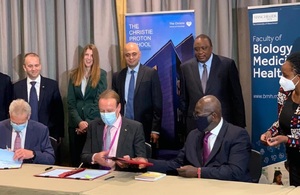Unemployed Kenyan nurses given chance to work in the UK under new Kenya-UK health agreements
In the programme, Kenyan health professionals and health managers will benefit from a special route to work in the UK, before returning to work in Kenya’s health sector.

Unemployed nurses and health workers from Kenya will have the chance to work in the UK as part of a new scheme requested by the Government of Kenya and launched by President Kenyatta today (29 July) during his visit to London.
In a programme to share knowledge and expertise, Kenyan health professionals and health managers will benefit from a special route to work in the UK. The agreement is open to Kenya’s surplus health workers who are qualified but unemployed, ensuring the process is managed for Kenya’s benefit.
UK Health Secretary, Sajid Javid, and Kenya’s Cabinet Secretary for Labour Cooperation, Simon Chelugui, signed the agreement on Kenyan recruitment into the UK’s National Health Service. It came on the third day of President Kenyatta’s visit to London, on a tour of the Royal College of Physicians in London. The special programme came at the request of the Government of Kenya to channel nurses currently unemployed into jobs.
The President also witnessed the signing of the Kenya-UK Health Alliance, which will bring together UK and Kenyan institutions – universities, teaching hospitals – cooperating on health partnerships.
One of the flagship partnerships is on improving cancer treatment for Kenyans, thanks to a tie-up between Kenyatta University Teaching Research and Referral Hospital and the University of Manchester/Christie NHS Foundation Trust. It will help improve prevention and management of cancer in Kenya, and promote Kenya a regional hub for cancer treatment.
Jane Marriott, the British High Commissioner to Kenya, said:
Our health partnership with Kenya is 30 years old and growing stronger by the month. This new agreement on health workers allows us to share skills and expertise even further, and is a fantastic opportunity for Kenyans to work in the UK.
From COVID-19 vaccines and genomic sequencing, to exchanges on cancer research and treatment to help Kenya treatment more cancer patients at home, the UK has a long and proud history of support for Kenya’s health sector. The signing of the Kenya-UK Health Alliance by President Kenyatta on his visit to the UK is the latest chapter in our flourishing partnership.
The UK’s Secretary of State for Health, Sajid Javid, said:
We have a historic and mutually respectful relationship with Kenya. This has been strengthened by working closely with Kenya during the pandemic and sharing UK vaccine doses to support Kenya’s fight against COVID-19.
Our healthcare agreement will make the most of UK and Kenyan health expertise which will be beneficial to both countries, with the exchange of knowledge and training which will provide first class healthcare.
It comes after a flurry of announcements of UK support for Kenya’s COVID-19 response, as part of our flourishing Health Partnership, signed by the UK’s Foreign Secretary, Dominic Raab, and Kenya’s Cabinet Secretary for Health, Mutahi Kagwe, during a visit to Nairobi in January 2021.
On 28 July, Prime Minister Johnson confirmed the donation of 817,000 COVID-19 AstraZeneca vaccine doses for Kenya – half a bilateral donation, and half a UK donation through the COVAX facility – while earlier this month we announced new support on genomic sequencing with KEMRI to tackle emerging COVID-19 variants. Kenyan and British scientists at KEMRI and Oxford University were closely involved in the development of the AstraZeneca vaccine, through trials of the vaccine through KEMRI Kilifi.
Notes to Editors
-
The special arrangement for Kenyan nurses to come to the UK was part of a request by the Government of Kenya to capitalise in those qualified but unemployed health workers in Kenya. The exact numbers who will go to the UK – and the process for visas – will be confirmed in the next three months. Kenya and UK have a mutual agreement for health workforce collaboration that provides for bilateral knowledge exchange and capacity improvement. Both countries seek to benefit from each other’s experiences and comparative strengths in healthcare.
-
In the NHS in England there are 894 Kenyans working across all roles. This makes Kenyans the 30th largest nationality group in the NHS. Positive economic impacts as a result of well-managed migration results from:
-
Evidence that where a job can lead to global opportunities (such as nursing) more people will enter training in the home country, than if those global opportunities were not there;
-
The money sent home by those overseas is significant. To the Philippines, remittances account for about 10% of national GDP; and
-
Some countries we recruit from leverage recruitment or administration fees. This can then be reinvested in employment within the local health sector or in additional training.
-
-
The launch of the Kenya-UK Health Alliance formalises all the cooperation and partnerships between our non-governmental institutions on health, such as universities, hospitals, and research institutions. In Kenya, it includes: Kenyatta University Teaching, Referral and Research Hospital (KUTTRH); Kisii University; Egerton University; University of Nairobi; and Maseno University. Given the growing burden of cancer in Kenya, developing a comprehensive cancer service for the country and the entire East Africa Region is an essential part of this programme.